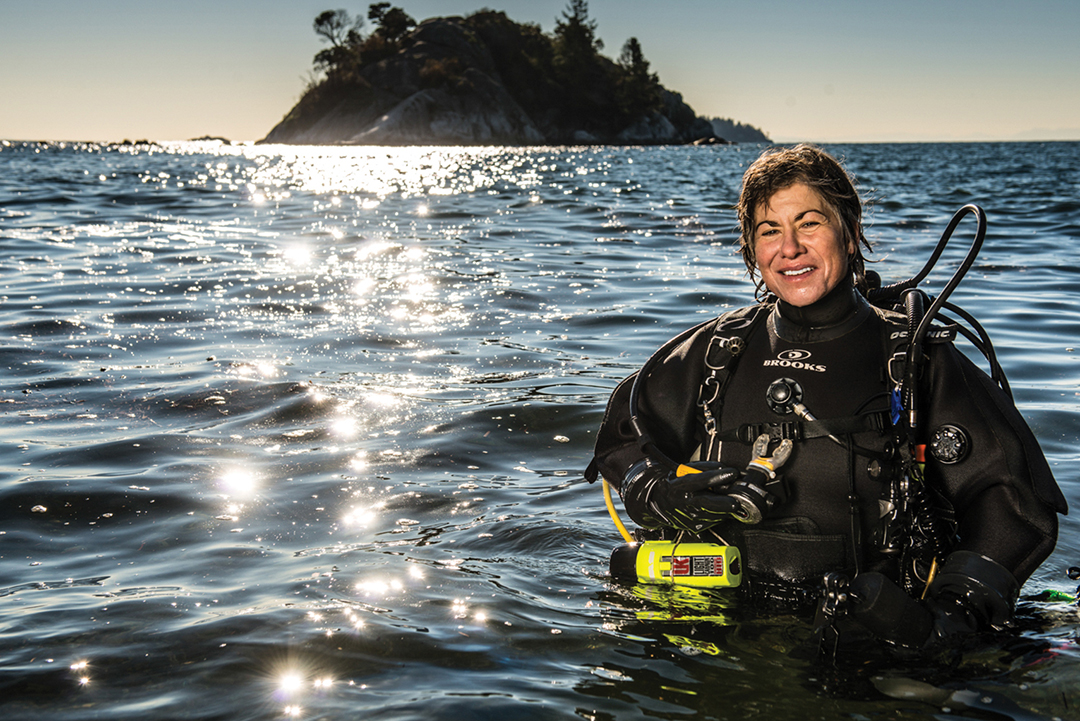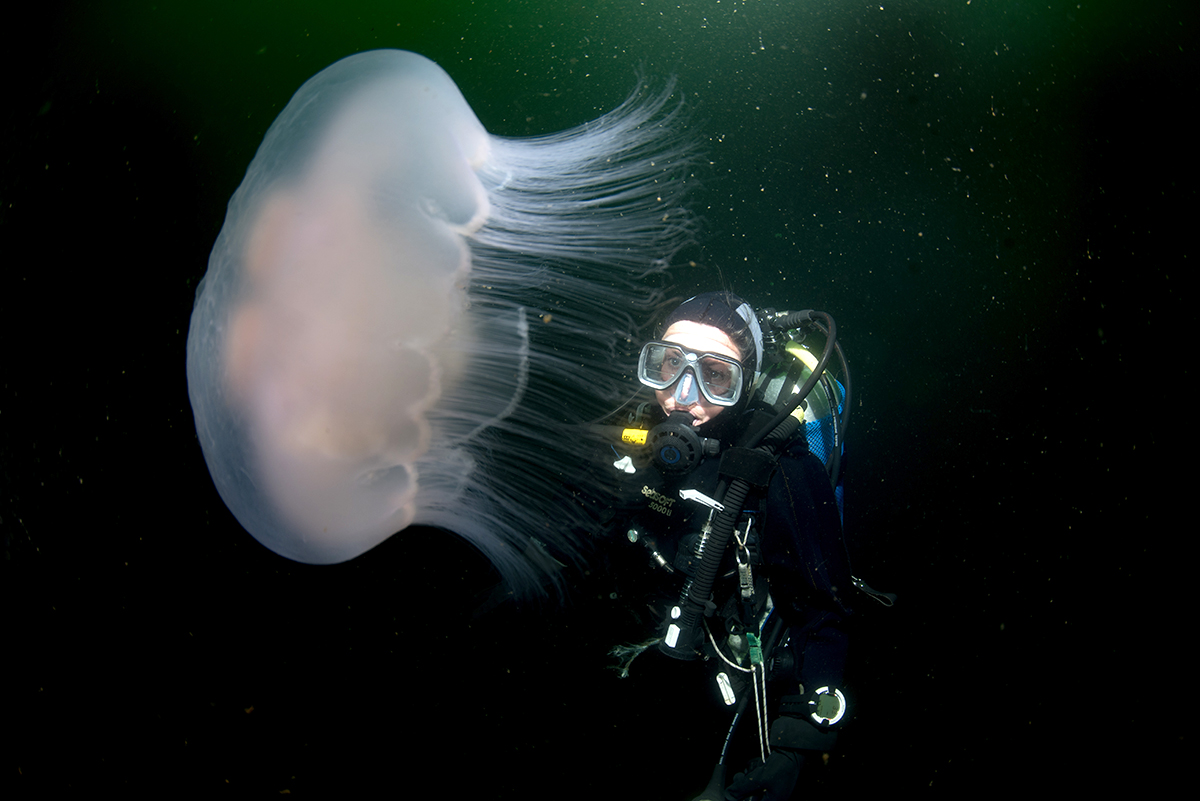After many years away from the Island, Jackie Hildering returned to visit friends in 1999. They arranged for her to go on a whale watching tour and while on board she realized she was no longer the kind of educator that she wanted to be.
“On the deck of that boat, it was just an enormous shake up,” she said. “I just wanted to get back and be the kind of biology teacher that was themselves, connected to nature.”
Upon returning to her job as the deputy head of the International School of Rotterdam, in the Netherlands, she couldn’t shake that feeling. So, Hildering moved back, hoping to get a job on that very same whale watching boat. She did and she’s never looked back.
“It was the best move I ever made,” she said. “This niche opened up because of my background in international education, my annoying skills as a teacher, my curiosity, my bossiness – all those things.”
Hildering calls herself The Marine Detective. Though more of a teacher than a detective, she hopes the title portrays a sense of humility as well as ongoing learning.

“I’m learning things in this privileged life that I am able to lead on Vancouver Island,” she said. “I want it to count for greater awareness and greater action.”
Hildering co-founded the Marine Education Research Society (MERS). The association brought together the existing marine research and education projects in the area and provides a platform to create new projects.
At the moment in MERS, Hildering is doing humpback whale research. According to the website, the project consists of creating and sustaining a photo identification catalogue of the humpback whales in the area around NE Vancouver Island as well as researching threats to the population.
Humpback whales are one of the many marine animals living in the cold, dark northeastern Pacific Ocean, a place that many, wrongly believe, doesn’t sustain much life.
“The waters are so dark because they’re an incredible thick soup of life that can sustain giants like killer whales, humpback whales and Steller sea lions,” Hildering said.
Because of this misconception about life under the surface, Hildering believes that her underwater photography is the most valuable thing that she does. She learned to dive just after she got the job working on the whale watching boat all those years ago. She hopes that her photos open up the ocean so that people better understand their connection with it.
“There’s something, as I roll off a boat and submerge myself, that is complete escape,” she said. “It is a learning experience, it is humility. I feel more relaxed than when I am on the surface. I gain my motivation and inspiration from the ocean.”
As well as doing research through MERS, Hildering works as a marine naturalist, educating a wide variety of audiences and raising awareness about preserving the ocean and the life within it.
Her focus is on the ocean because it so often testifies to environmental problems first. “Species within it are often indicators,” she said, providing the examples of bioaccumulation of toxins in killer whales and the potential influence of climate change on Sea Star Wasting Syndrome.
So what can we do to help?
According to Hildering, it all boils down to using less, exercising precaution and knowing your connection to the environment.
“One of the biggies is using less fossil fuels and dangerous chemicals,” Hildering said. “Another, is to have an understanding of our connectedness and reliance on the marine environment as the life-sustaining force on earth.”

In other words what we do, what we consume and what we throw away has an impact on the ocean upon which life depends.
Hildering believes that one of the major setbacks to making much needed changes is the bipolarity of environmentalism. “Too many of us seem to think that it is an either / or situation where there are only two extreme options, to consume without restraint or to have to be “perfect” when it comes to sustainability” she said. She emphasized how it is ridiculous to think along the lines of being either a resource user or an environmentalist.
Hildering is trying to combat the paralysis that appears to come from such thinking by spreading the word that there are common solutions to environmental problems and that there is a wide spectrum of actions whereby we can reduce our ecological footprints and, so often, increase our quality of life.
“We don’t need to go into a state of eco-anxiety,” she said. Hildering focuses on reducing energy use, choosing durable products that don’t have to be replaced as often, using biodegradable chemicals and avoiding plastics.
At the end of the day she advocates for a shift away from the consumer paradigm and she is confident that we will be successful.
“We have an incredible capacity for positive change when knowledge replaces fear,” she said.
We have come so far in such a short time, she pointed out. Even in the late 1960s society’s attitudes were such that we were executing killer whales, receiving a bounty from the government for killing seals, whaling humpbacks and bombing the places where sea lions have their babies. It is testament to how quickly our value systems can change that such acts would never be tolerated now. But, we still have a long way to go.
“Those who have the power now, which is the consumer-based oil and gas paradigm, they want us actually to continue in the same way,” she said.
To combat this we have to realize that our values are being shaped by these forces, that it benefits those who have power in this paradigm to keep the general public fearful and continuing on in the same way. Hildering believes we can bring about change by shifting our values, understanding our place in nature and embracing our ingenuity.
Working to this end, Hildering can be found on the ocean or under the surface, photographing the life that she finds there. She said she spends at least 45 minutes a week underwater. The epicentre of her work is Telegraph Cove because the strong currents sustain so much life. It is the one part of the world that she knows really, really well.
People often ask her if she has visited the Great Barrier Reef, she hasn’t, she figures there are enough people advocating to save warmer oceans. “[It is] the mystery and fragility in our dark waters that need more voices,” she said.
“We have an incredible capacity for positive change when knowledge replaces fear.”
Though that epiphany on the whale watching boat in 1999 is still her most remarkable experience, Hildering has seen many amazing things since becoming The Marine Detective.
Once she turned around to see an octopus embracing her dive buddy’s head. The photo she snapped managed to capture the non-threatening, intelligent and hug-like encounter for what it was.
She finds that many of her magical moments occur when she is exploring a kelp forest.
For her, those are the happiest places on earth and she thinks of them as the interface of the marine world, where the air and the ocean meet.
“I think one of the key elements of living a life of meaning and connection and all those things, is about humility,” Hildering said. “And when I’m in the ocean I so understand that I am not in charge.”
Though Hildering has a degree in animal science and a teaching degree in biology, when it comes to environmental education she is self “in the trenches” taught.
When teaching, whether it be on a boat or in a classroom, Hildering focuses on the beauty of the environment, the resilience of nature and our connection to it.
“I absolutely know that I am doing what I could best be doing with my life,” she said.
As well as MERS Hildering worked as an education coordinator for the Department of Fisheries and Oceans, the communications director for the SOS Marine Conservation Foundation and the community liaison for the ’Namgis First Nation’s KUTERRA land-based salmon farm.
In 2010 Hildering was recognized by the DFO director as a person “whose contribution to the preservation of the salmon resources on the North-Island has helped ensure a better future for all Canadians”.
In 2011 she was recognized by the Vancouver Aquarium with the Murray A. Newman Award for excellence in aquatic conservation. future for all Canadians.
In 2011 she was recognized by the Vancouver Aquarium with the Murray A. Newman Award for excellence in aquatic conservation.
www.TheMarineDetective.com